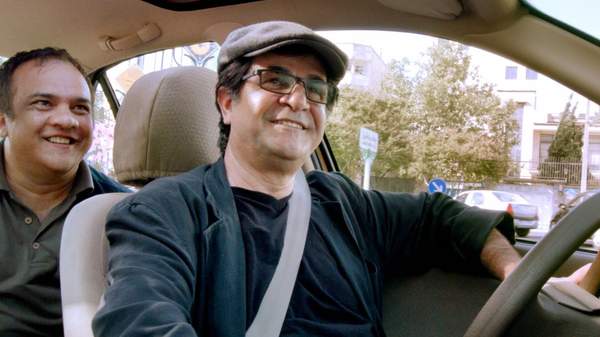Overview
It may sound like a cliché, describing a filmmaker as courageous. But when it comes to Jafar Panahi, it really is the only word that fits. For years, Panahi's films, including The Circle and Offside, drew the ire of censors in his native Iran for their frank depictions of the hardships felt by people, and particularly women, under the nation's conservative regime. This came to a head in 2010 when he was arrested on propaganda charges and later slapped with a 20 year ban from filmmaking – a ban he has been defying ever since.
Tehran Taxi, which won the top prize at the Berlin Film Festival back in February, is Panahi's third film to be made under these restrictions, following This Is Not A Film in 2011 and Closed Curtain in 2013. Those films were shot in secret in his apartment and beachside villa, respectively. This time he's a little bolder, shooting surreptitiously from the inside of a cab as he drives it around the city, capturing his conversations with various passengers – including a schoolteacher, a lawyer and a thief – with a small dashboard camera. Whether these characters are real people or actors (or a combination of both) is intentionally left unclear, as Panahi playfully blurs the line between documentary and fiction.
It's this playfulness and good humour that is key to the movie's success. In Panahi's previous two films, you can sense his frustration and feelings of helplessness – and given his situation, you can hardly hold that against him. They're fascinating works, and important, but more by virtue of their existence than their content. They feel like therapy, not films. Tehran Taxi, on the other hand, plays like a movie in its own right. Here, Panahi mixes the meta elements of his recent output with the shrewd social commentary of his pre-arrest work, all buoyed by a lightness and a cheekiness that makes it accessible to audiences far beyond the arthouse.
Indeed, much of Tehran Taxi plays like a straightforward comedy. In one segment, a friendly vendor of pirated DVDs attempts to partner up with Panahi, reasoning that more people will buy his wares – including copies of Midnight in Paris and The Big Bang Theory – if he's working with a famous filmmaker. In another segment, Panahi must ferry two panicked, superstitious old women across town, so they might return their goldfish to a sacred spring in order to buy themselves another year of life. But the most delightful scenes belong to Panahi's young niece Hana, whose lively repartee with her uncle – after he picks her up an hour late from primary school – will leave you smiling from ear to ear.
Of course even beneath the humour, Panahi's rebellious spirit shines through. Hana, we soon learn, wants to make a film herself, but she's baffled by the instructions of her school teacher, who insists that movies mustn't discuss political or economic issues, and that the students should remove anything dark or unpleasant. "There are realities they don't want shown," explains her uncle. In another scene, they give a ride to a friend of Panahi's, human rights lawyer Nasrin Sotoudeh, who is on her way to visit the family of a woman who has been imprisoned for trying to sneak into a volleyball game.
Yet even the film's more more serious moments, or in its abrupt, unsettling ending, Tehran Taxi leaves viewers with a sense of hope. It's a film that throws the hypocrisy of oppressors back in their face, and does so with a wry sense of humour. We'll end this review with a quote from filmmaker Darren Aronofsky, who headed the Berlin Festival jury that awarded Panahi top honours. "Instead of allowing his spirit to be crushed and giving up, instead of allowing himself to be filled with anger and frustration, Jafar Panahi created a love letter to cinema. His film is filled with love for his art, his community, his country and his audience."
Features
Information
When
Sunday, December 27, 2015 - Sunday, January 17, 2016
Sunday, December 27, 2015 - Sunday, January 17, 2016
Where
ACMIFlinders Street
Melbourne
